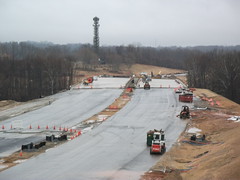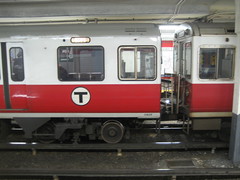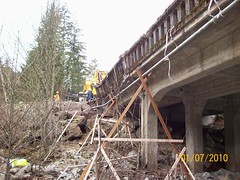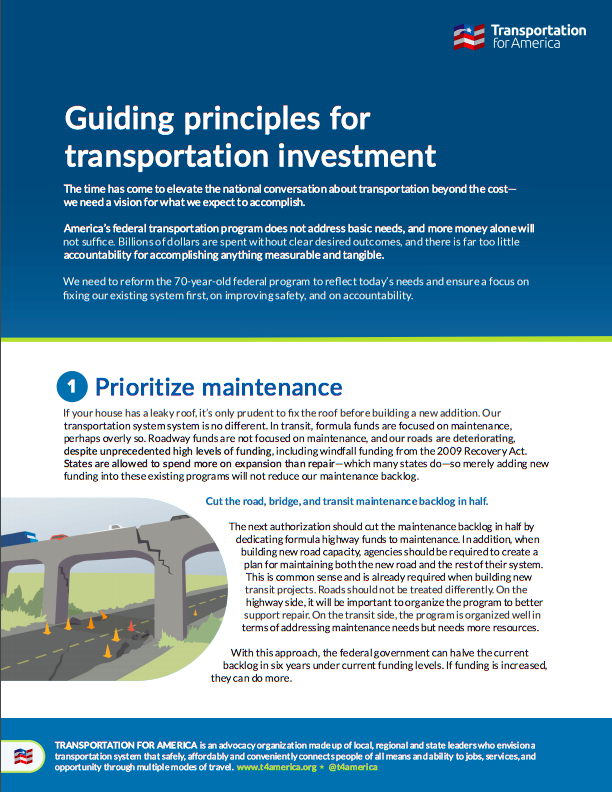Reaction to President Obama’s nomination of Mayor Anthony Foxx as U.S. DOT Secretary
WASHINGTON, D.C. – Responding to President Obama’s nomination of Charlotte Mayor Anthony Foxx as Secretary of the U.S. Department of Transportation, Transportation for America Director James Corless issued this statement:
NPR: 19 states (and counting) creating plans to raise more transportation dollars
 More than a third of all U.S. states have plans of some sort to raise new money for transportation to help cover yawning budget shortfalls and keep up with maintenance and new construction of their state transportation networks. NPR picked up that story this week and talked to T4 America director James Corless about the growing trend of states stepping out on their own to raise their own money for transportation to augment the federal funding that did not increase with the last transportation bill.
More than a third of all U.S. states have plans of some sort to raise new money for transportation to help cover yawning budget shortfalls and keep up with maintenance and new construction of their state transportation networks. NPR picked up that story this week and talked to T4 America director James Corless about the growing trend of states stepping out on their own to raise their own money for transportation to augment the federal funding that did not increase with the last transportation bill.
Tracking state transportation funding plans
 With MAP-21 signed into law last summer, attention has shifted from Washington to the states. In many cases, states have looked at the bottom line in MAP-21 and are deciding that they need more money for transportation and are embarking on ambitious and often groundbreaking plans to raise additional revenues for transportation. Visit the home for state plans here, where we’re tracking all of the proposed (and enacted) plans in one easy, simple chart. If you see something we’ve gotten wrong or a state we should add, drop us a line and let us know.
With MAP-21 signed into law last summer, attention has shifted from Washington to the states. In many cases, states have looked at the bottom line in MAP-21 and are deciding that they need more money for transportation and are embarking on ambitious and often groundbreaking plans to raise additional revenues for transportation. Visit the home for state plans here, where we’re tracking all of the proposed (and enacted) plans in one easy, simple chart. If you see something we’ve gotten wrong or a state we should add, drop us a line and let us know.
Senate budget lays the groundwork for fairer, increased transportation funding
We’ve previously written about how Amtrak passenger rail, new public transit construction and the innovative TIGER program just had their budgets slashed in sequestration at a rate five times higher than traditional highway programs. There’s no way to prevent those cuts this year, but the Senate’s new budget for the next ten years — the first they’ve approved in years — lays the groundwork to create dedicated funding for transit, passenger rail and the innovative competitive TIGER projects, as well as generating new revenues for transportation.
Ambitious Maryland plan moves forward to index gas tax, add sales tax for transportation
 When Maryland’s Intercounty Connector (ICC) highway opened in 2011, it did more than create a new east-west toll road between I-270 and I-95 in the northern suburbs of Washington, DC: It also severely hampered Maryland’s ability to build other large-scale transportation projects for years to come. But now there’s significant momentum to raise new state revenues for transportation to ensure that the state won’t have to shelve their plans for a 21st century transportation system.
When Maryland’s Intercounty Connector (ICC) highway opened in 2011, it did more than create a new east-west toll road between I-270 and I-95 in the northern suburbs of Washington, DC: It also severely hampered Maryland’s ability to build other large-scale transportation projects for years to come. But now there’s significant momentum to raise new state revenues for transportation to ensure that the state won’t have to shelve their plans for a 21st century transportation system.
The impacts of sequestration: comparing 2012 to 2013
If your head is spinning from trying to figure out what sequestration, the “continuing resolution” for spending and the myriad proposed budgets have on transportation funding, this simple chart is for you.
A state with one of the oldest transportation systems tries to make things new — new state series
 Though Massachusetts’ bridges are middle of the pack in deficiency, they’re beyond middle age (an average of 56-plus years) and many of its busy subways, bus lines and commuter trains – and the roads, bridges and tunnels that carry them — are starting to fall apart after decades of heavy use. Saddled with debt from the Big Dig (among other things) and chronically underfunded after years of budget cuts, Massachusetts leaders and advocates are trying to reform their transportation agencies while raising new money to bring an aging system into the 21st century.
Though Massachusetts’ bridges are middle of the pack in deficiency, they’re beyond middle age (an average of 56-plus years) and many of its busy subways, bus lines and commuter trains – and the roads, bridges and tunnels that carry them — are starting to fall apart after decades of heavy use. Saddled with debt from the Big Dig (among other things) and chronically underfunded after years of budget cuts, Massachusetts leaders and advocates are trying to reform their transportation agencies while raising new money to bring an aging system into the 21st century.
America’s infrastructure improves slightly over 2009, still a failing grade
 America’s civil engineers raised the grade given to our country’s infrastructure from four years ago, but unfortunately, it’s still a failing grade for America. With the $3.3 trillion dollars needed by 2020 (according to ASCE) unlikely to arrive in this current climate of reduced budgets and austerity, is there a way forward that can make smarter decisions with the money we have and knock back our maintenance backlog while still investing in the 21st century infrastructure our country needs?
America’s civil engineers raised the grade given to our country’s infrastructure from four years ago, but unfortunately, it’s still a failing grade for America. With the $3.3 trillion dollars needed by 2020 (according to ASCE) unlikely to arrive in this current climate of reduced budgets and austerity, is there a way forward that can make smarter decisions with the money we have and knock back our maintenance backlog while still investing in the 21st century infrastructure our country needs?
Little has changed with the latest edition of the report card on US infrastructure
On the release today of the American Society of Civil Engineers’ Report Card on America’s Infrastructure, Transportation for America’s Director James Corless released the following statement…
Unequal sequestration cuts show the need for a real transportation fund
If Congress can’t come to a deal to avoid automatic budget cuts March 1, some transportation programs will take a serious hit, while others will be protected. Here’s a rule of thumb: The more innovative and popular with local communities they are, the more likely they are to feel the blow.





